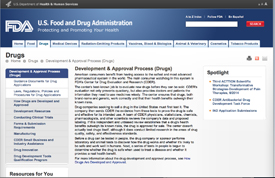News You Can Use
Let’s Talk: Communicating Early with the FDA
Pre-IND Meetings with FDA May Help Shorten Drug Development Time
The path from discovery to approval can be long, but meeting early with the Food and Drug Administration (FDA) may significantly shorten it.
In 2013, FDA researchers studied the clinical development times of all drugs approved between 2010 and 2012. On average, it took 10 to 15 years to develop a drug. When a clinical investigator of the drug met with the FDA before beginning clinical trials, the FDA researchers found that the average development was three to six years shorter.
“We think early communication can make a big difference regarding quality and efficiency,” said Anne Pariser, an associate director in the Rare Diseases Program at FDA’s Center for Drug Evaluation and Research.

Why? In short, the FDA can provide advice to help you be sure you are entering the process most efficiently. A clinical investigator must submit an investigational new drug (IND) application to the FDA before he or she can test the drug in human subjects. The application typically requests information about the drug’s nonclinical toxicology profile and any safety information available from prior human administration, drug formulation and characterization, proposed dosage, and the proposed clinical protocol and monitoring plan. The FDA wants to ensure that clinical-trial participants are protected from unnecessary risk; in reviewing the IND application, FDA focuses primarily on safety for first-in-human and early-phase clinical trials.
Before submitting the application, the investigator can request a pre-IND meeting with the FDA to ask for advice on clinical-trial design and to learn about necessary IND-enabling elements, including preclinical pharmacology and toxicology.
“Any investigator can request a meeting with the FDA,” said Pariser. “These early meetings are particularly important for the development of drugs for rare diseases.”
Pre-IND meetings with the FDA are not required but are encouraged to avoid unnecessary delays. For example, if an investigator’s IND application is missing important information, the FDA will place the application on “clinical hold,” and the investigator cannot begin clinical trials until the clinical hold has been addressed. The delay could have been avoided had the investigator requested a pre-IND meeting and learned what was needed for the application to be considered complete.
To schedule a pre-IND meeting, an investigator must submit a written request to the FDA. Should the meeting request be granted, FDA tries to schedule the meeting within 60 days of receipt of the request. The clinical investigator should submit the background package for the meeting as well as questions to be addressed at least four weeks before the meeting. Pariser recommended scheduling the meeting prior to conducting animal-toxicity studies. However, the timing of a pre-IND meeting depends on where the sponsor is in the development process.
Pariser co-chaired a Joint Task Force with Juan Lertora, director of clinical pharmacology at the NIH Clinical Center. The task force encourages and facilitates early interactions with FDA regulatory staff.
For more information visit http://www.fda.gov/Drugs/DevelopmentApprovalProcess
The document Guidance for Industry: Formal Meetings between the FDA and Sponsors or Applicants can be found at Bitly: http://1.usa.gov/1qgJ5rp
A version of this article first appeared in the August issue of the NIH Clinical Center News (http://www.cc.nih.gov/about/news/newsletter.html#story5).
This page was last updated on Tuesday, April 26, 2022
